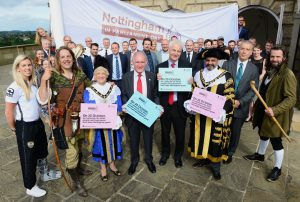September 6, 2016, by Liz Cass
Brexit makes an initiative like Nottingham in Parliament Day even more relevant…
 If the UK wants to extend its reach in the global economy it will have to capitalise on the industrial strengths of its key cities as it moves into a post-Brexit future. Professor Sir David Greenaway explains why Nottingham will make the case to be in the vanguard of that drive.
If the UK wants to extend its reach in the global economy it will have to capitalise on the industrial strengths of its key cities as it moves into a post-Brexit future. Professor Sir David Greenaway explains why Nottingham will make the case to be in the vanguard of that drive.
It’s a game which all UK provincial cities have a habit of playing: comparing themselves to the big hitters and concluding that they’re under-appreciated.
Sir David Greenaway, the Vice Chancellor of the University of Nottingham, certainly agrees that his is a city which has good reason to shout louder.
“As a city, we sometimes compare ourselves with London and Manchester and think that we’re something small,” he says. “But we’re actually the ninth biggest city in the fifth biggest economy in the world! That’s not small.
“We have huge strengths in those areas that play to the Government’s agenda of great technologies. Yet we don’t have a loud enough voice in Westminster.”
That could be about to change thanks to an initiative that started life at the University itself: Nottingham in Parliament Day, a one-day takeover of the Palace of Westminster sanctioned by Speaker John Bercow and featuring the University, major businesses such as Boots and Experian, Nottingham City Council, and even Robin Hood.
 Many cities have beaten a path to Westminster before. So why is Nottingham’s arrival in SW1 any different?
Many cities have beaten a path to Westminster before. So why is Nottingham’s arrival in SW1 any different?
For one thing, its timing appears prescient, says Sir David: “Brexit makes an initiative like Nottingham in Parliament Day even more important, even more relevant. It doesn’t matter whether you voted for or against, the vote has happened and we need to move forwards. That means ensuring we all work hard to maintain the connections we have got in greater Europe. We are certainly working on that.
“We also have to make sure we develop the right connections outside Western Europe and build on what we have in Asia. We’ve been in China for more than a decade – we opened the first truly Western campus there, our Chinese students are taking influential jobs in government and business in China, our commitment has translated into commercial links with the Midlands as a region. We were ahead of the game – and as a country we have to stay there. Building on these proven links will be the most effective way to do that.
“But there is another reason why this initiative is important. Whatever has happened in the past, my guess is that the UK regional agenda will get more of a push in the light of Brexit.
“One of the things that came out of the referendum for politicians is the message that far too much is focused on London and the South East. This was a complicated vote which contained all sorts of nuances, but that was certainly one of the messages and I think they realise that. That makes it all the more important that we are on the front foot as a city and a region.”
Sir David, who chairs the Russell Group of research intensive universities, believes Nottingham in Parliament Day represents the start of a major drive to get Westminster to understand that the eighth biggest city should be much further up the priority list for the sake of the UK’s economic future.
He explains: “Government needs to know that Nottingham matters for two key, strategic reasons. It’s an important part of the Midlands Engine, which is about more than just the West Midlands and the automotive industry. It’s also about better exploiting the strengths of the East Midlands economy, which are considerable.
“Then there are those strengths in the great technologies that support science and business going into the future. That has to be at the centre of a forward-looking industrial strategy.
“One of those great eight is Big Data. Nottingham doesn’t pitch itself as central to Big Data but it has been for a long time – we have large organisations like Experian, which is almost a heritage business in Big Data, and an important ecosystem of smaller, growing companies operating in the same sector. The level of data and digital talent here is of international standing.
“The same is true of life sciences. It’s a heritage industry in Nottingham. BioCity is one of its biggest concentrations. Energy is another of the great technologies – one of the Energy Research Accelerator hubs is right here.
“All of these things have concentrations in Nottingham. All of them are activities which speak to the future, not the past.”
 In Sir David’s view, Nottingham has to make the case for resources which will support and enhance this global potential. As a city, it has invested well in improving an integrated transport network which will preserve its economic functionality into the future and connect people with opportunities. But those connections now need to extend further, and functionality is as much technological as it is physical.
In Sir David’s view, Nottingham has to make the case for resources which will support and enhance this global potential. As a city, it has invested well in improving an integrated transport network which will preserve its economic functionality into the future and connect people with opportunities. But those connections now need to extend further, and functionality is as much technological as it is physical.
“Technology infrastructure has to be the next big push – we can’t afford for our broadband infrastructure to end up in the same situation as the A453 [where Nottingham waited decades for funding to turn an arterial link to the M1 into a dual carriageway]. That would have serious consequences.
“Our physical infrastructure is pretty good – we have an expanding tram network – but there are still some deficiencies, not least connectivity between the airport and the parkway and the city. So can we do something to speed up those links?
“That has to be part of Nottingham’s big ask of government, it’s certainly what business will be looking for. My guess is that infrastructure development is going to be tied to re-energizing the regions. The city’s history with infrastructure suggests it knows how to make these investments pay off.”
Will one day in Westminster turn on a miraculous tap which will transform Nottingham? Sir David says Nottingham in Parliament Day can only be the beginning of a campaign to get the city’s significant strengths and substantial potential better understood.
“If this was a one-off and that was all it was it wouldn’t be worth doing,” he says bluntly. “In terms of follow-ups, we’ve built a team here at the University that has put this together, built the coalition of partners behind it and we’ve got to look at following up in terms of sectors and themes.
“We should ask ourselves as a city, if this is successful then what do the next steps look like – will it be something different in the same place, or will it be something the same in a different place?
“This is about making what we do here visible, in the process reinforcing some of the connections we have with major business partners – Rolls-Royce will be there, so will Boots, these are people we work with already. But I really hope other relationships will come out of this too.”
No comments yet, fill out a comment to be the first

Leave a Reply